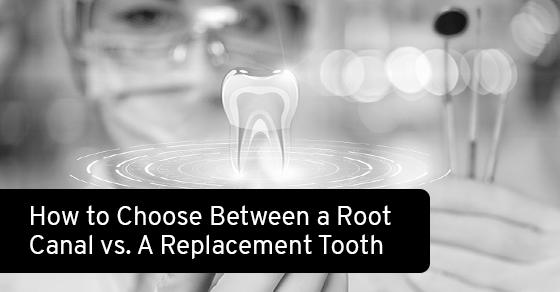
When a tooth is damaged because of deep cavity issues, it commonly means a root canal or replacement tooth procedure is needed. Root canal treatment in Oakville is a standard procedure that is performed by your dentist in the clinic and requires minor recovery. A replacement tooth may require the services of an orthodontist, and needs several appointments and a long healing process.
Both treatments are useful when required, and both are offered through Oakville Place Dental. When faced with the question of which is better, however, it helps to speak with your dentist. It also helps to have all the information on both treatments.
At Oakville Place Dental, we serve families across Oakville, Ontario. Building relationships with our patients helps us deliver the best quality service. That’s why we’ve developed a guide to help you determine which option is right for you. If you’re wondering how to choose between a root canal or a replacement tooth, here’s what you should know.
Root canal treatment in Oakville offers a variety of advantages, one being cost. A root canal is usually about half the cost of an implant. This is because the implant requires more work and physical material to create. On average, you can expect a root canal treatment in Oakville to cost about $1000, although it could be less depending on the dentist, the severity of the cavity, and other factors.
Another cost comparison to consider is insurance coverage. Most insurance companies cover some of, or all, of a root canal, as they are often considered essential services. An implant, though, may be deemed an aesthetic issue, and thus go uncovered by insurance. It helps to speak with your insurance provider or check your plan to see how much of your procedure will be covered, whichever you choose.
Speaking of aesthetics, a dental implant has the advantage of producing a nice, shiny new tooth. This is attractive to some patients, especially if the tooth being treated has gone through physical trauma.
When you get a tooth implant, the problematic tooth is removed, a post is drilled into your jawbone, and a connector is attached before the crown is placed. The crown looks and feels like a real tooth, and may even be nicer to look at than your real tooth was.
Implants differ from root canals in that the root canal leaves your original tooth in place. Your dentist simply treats it from the inside by extracting affected materials and then filling the tooth. Of course, you can always have your teeth whitened, or speak to your dentist about aesthetic treatment if you prefer a root canal, but want to update your smile.
If you’re planning on getting back to the office early, then a root canal is the best option. Whereas an implant requires several visits, a lengthy wait period of 5 to 12 months while your gums and jawbone heal, and further dental visits for getting the crown installed, root canals take only 1 or 2 visits and heal quickly.
You may feel tender following a root canal, and may not want to eat right away. Your dentist will give you aftercare instructions to ensure the root canal heals well and you don’t hurt yourself or your tooth while healing.
Compared to the lengthy recovery of an implant, the root canal is preferred for patients hoping to make a quick turnaround. Many people go back to work, school, or social events the day after a root canal with no issues. Some may even return to work the day of a root canal procedure. However, this depends on pain levels and swelling.
Dental implants are constructed of high quality, durable materials. They are long lasting, and a good choice if you are concerned about brittle teeth following the root canal treatment. A root canal doesn’t further deteriorate the tooth. If your tooth is strong and healthy (aside from the internal infection or cavity), then it could last just as long as an implant.
Your dentist is the best judge of whether you are a good candidate for the root canal treatment. If he or she feels it is not a safe treatment due to the quality of your teeth, they may suggest an implant.
The root canal is a preferred treatment for many dentists because they are less invasive. Unless a dentist feels an implant is necessary, they will likely recommend a root canal.
As mentioned above, the implant process is quite time-consuming and requires drilling directly into the jawbone. This means a long healing process and many visits to the dentist or orthodontist. A root canal, on the other hand, is a less invasive treatment requiring drilling mainly into the tooth, not into the jaw.
When you decide that a root canal treatment in Oakville is the best option for your tooth, the next big decision is choosing a emergency dentist in Oakville. At Oakville Place Dental, we are thankful to have a top team of experienced dentists with a wide range of specializations.
With years of experience in root canals, you can count on Oakville Place Dental to provide quick, efficient, and careful work on your teeth. We understand how important your smile is, and we work hard to ensure your teeth are looking their best throughout and following your procedure.
Another way that we at Oakville Place Dental set ourselves apart is through our personal touches. Our patients aren’t just names on a chart. As a local business, our patients are also friends and neighbours. We want the best for each person who walks into our clinic, and you can rest assured that we’ll take care of you like you are family.
Interested in learning more about Oakville Place Dental and our root canal services? We want to help. We invite you to call us at 1-647-496-2721 or visit us online.
 0 Comment
0 Comment